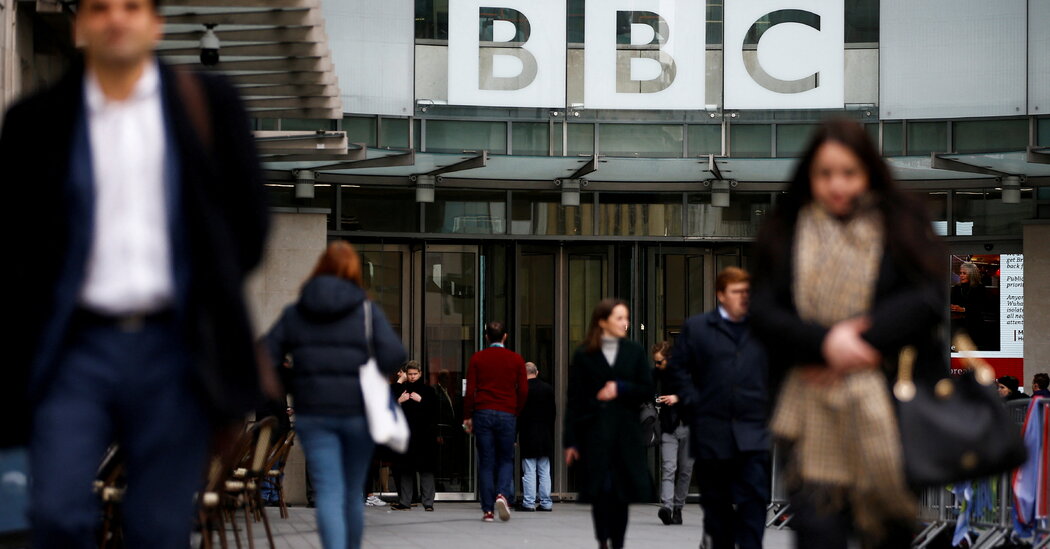The license fee on TV owners makes up three-quarters of the British broadcaster’s income and is guaranteed until 2027.
Over the weekend, a British government minister tried to deal a death blow to the main source of funding for the BBC, a license fee charged each year to any household with a TV.
Nadine Dorries, who oversees the BBC in the cabinet, said on Twitter that an imminent announcement about the license fee “will be the last.” But by Monday afternoon, standing in the House of Commons in Parliament, she walked back her contentious claim as she announced that the license fee would be frozen for the next two years — a move that could require substantial budget cuts at the public broadcaster just to keep up with fast inflation.
The funding freeze is “disappointing,” Richard Sharp, the BBC’s chairman, and Tim Davie, the director-general, said in a statement, and will “necessitate tougher choices.”
For four years from April 2024, the fee will rise again in line with inflation, Ms. Dorries said. The BBC and the government have been in negotiations since late 2020 over the amount that TV owners must pay over the next five years. For the past five years, the fee has increased in line with inflation annually.
“This is a very good result compared to alternative results, including the elimination of the license fee” and additional below-inflation increases, said Claire Enders, founder of Enders Analysis, a media research firm.
Three-quarters of the BBC’s income, about 3.75 billion pounds ($5.1 billion), comes from the license fee, which is currently £159 ($217) per household. The fee was introduced in 1923 to pay for radio. Now it funds eight national TV channels, 10 radio stations, local stations (including Welsh and Gaelic language services), educational content and on-demand services. Fourteen percent of the license fee funds non-BBC TV.
Ms. Dorries, who is the culture secretary, and fellow Conservatives have long argued that the BBC needs a big overhaul in how it is funded. They have also said it is too left-leaning and too London-centric.
“The days of the elderly being threatened with prison sentences and bailiffs knocking on doors are over,” Ms. Dorries said on Twitter on Sunday. “Time now to discuss and debate new ways of funding, supporting and selling great British content.”
In Parliament on Monday, in a more conciliatory tone and citing the BBC’s “unique place in our cultural heritage,” Ms. Dorries said that “it’s time to begin asking those really serious questions” about the funding of the BBC and whether the license fee was appropriate. But she wasn’t stating a policy. “We are announcing a debate and a discussion,” she said.
The BBC’s funding through the license fee is guaranteed until the end of 2027, after which the BBC’s Royal Charter expires and its mission, public purpose and funding method need to be renewed. New terms will be decided with the government of the day. But before then there will be another general election, which will determine the fate of the license fee.
In Britain, inflation is at its highest level in a decade, and freezing the license fee could require the broadcaster to make even more cuts. Ms. Dorries said any increase couldn’t be justified while millions of households were squeezed by rising energy bills and consumer prices. The Conservative government is also raising taxes in April to fund more health services.
Since 2016, the BBC has been undertaking a vast cost-cutting plan, trying to save £800 million annually. This fiscal year, it expects the savings to rise above £950 million. Last year, it cut 1,200 jobs.
The changes have come amid an overhaul of the BBC’s leadership. Since late 2020, a new director-general and chairman have been installed. Deborah Turness, who was president of NBC News, will be the BBC’s next director of news.
After complaints about bias in its news coverage, the broadcaster announced a plan last year to spend an additional £700 million outside London by 2027 and relocate 400 jobs.
The broadcaster has been facing increasing pressure, and not just from the government. The BBC is trying to reach a more diverse and younger audience while cutting costs, as big-budget streaming companies such as Netflix and Spotify expand in Britain.
On the future of the BBC’s funding and purpose, Mr. Sharp and Mr. Davie said that while all options should be considered, “the BBC is owned by the public, and their voice must always be the loudest when it comes to determining the BBC’s future.”
In Britain, the debate around the fee often focuses on the BBC’s news service, and whether everyone should be required to pay for it, said Meera Selva, the deputy director of the Reuters Institute for the Study of Journalism at the University of Oxford. The BBC also broadcasts other content, including documentaries and dramas. When schools closed during the pandemic, it also increased children’s educational output.
The next question for Britain to decide, Ms. Selva said, is “are we willing to pay for all content or just news?”
Alternative funding ideas include a direct grant from the government, a subscription service or a membership system that makes its content available to everyone for free but is funded by willing members. But unlike, say, Netflix, the BBC is being asked to provide many different services and is required to provide content that might not be commercially viable, Ms. Selva said.
“The license fee,” she said, “is the closest model we have for preserving editorial independence.”


























